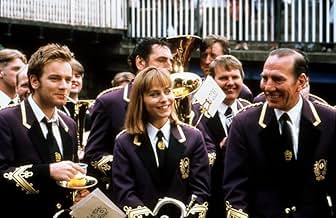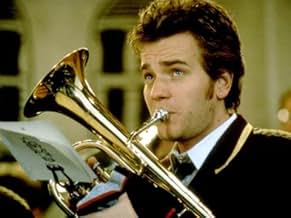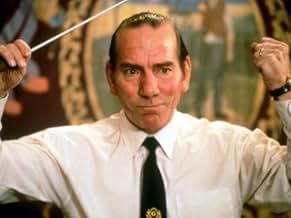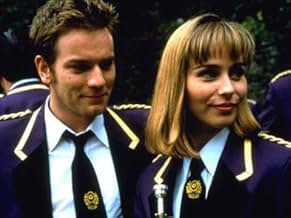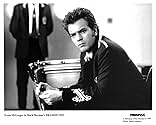Une mine de charbon dans un village du nord de l'Angleterre risque de fermer, ce qui signe la fin de la fanfare des mineurs.Une mine de charbon dans un village du nord de l'Angleterre risque de fermer, ce qui signe la fin de la fanfare des mineurs.Une mine de charbon dans un village du nord de l'Angleterre risque de fermer, ce qui signe la fin de la fanfare des mineurs.
- Réalisation
- Scénario
- Casting principal
- Nomination aux 3 BAFTA Awards
- 10 victoires et 7 nominations au total
- Greasley
- (as Ken Colley)
Avis à la une
Firstly, from a musical point of view, Gloria does not enter the Grimley bandroom with an obligato cornet, it's a flugelhorn.
The fact that a woman has entered the band room is important. For a long time, the brass band was the domain of men. Women weren't allowed to play in the bands and indeed, this is still the case today in two of the biggest names in the banding world.
Underpinning all this is the fact that the film is (at least) semi-biographical. The events unfolding in the film mirror in no small way the same events which befell the Grimethorpe pit in 1992, and impacted on the world-famous Grimethorpe Colliery band. Thatcher's Britain did result in the pit closing down, and threatened the band's future. The band did take the stage at the National Final, and so the reason that the band don't turn professional is because there is no room in the banding movement for a professional band.
For a point of information, there are 4 basses in a Brass Band, 2 Eb and 2 Bb (not 2 or 3). Oh yes, and bandsmen most certainly do carry there instruments through the street without a case, especially bass players.
On a slightly different point, Phil does not have a gambling habit. He is still paying off the loan that he took out in 1982 to cover the loss of earnings because "suspended I were. 18 b****** months it took that lot to sort it out. 18 b***** months on strike pay. That's how big a f***** deal it is mate."
There are pit closures all over Yorkshire, and 'Grimley' Band has one last chance to triumph in the various band contests to end up playing at the Royal Albert Hall. This being drama of course the path to victory isn't a smooth one - there is bankruptcy, illness, broken marriages, and a clash with the new executive power (represented by Tara Fitzgerald, also taking a place in the band for her father). Romantic interest for Tara is present in cute Ewan McGregor - an unusually quiet role for him.
Say what you like about the way this film portrays the North of England, there is no denying the power of the final sequences as the triumph of 'William Tell' turns into Postlethwaite's power rant against the Government and into the trip home's 'Land of Hope and Bloody Glory'. It really couldn't have been done better.
I've read some reviews condemning the politics of this film. Well, I applaud the political message. I grew up near an industrial town; one centered on the auto industry, heavy machinery, and agri-business. As I got older, I watched it disintegrate, through the 70's and 80's, as the grain embargo, auto industry woes and recession bled the life out of the town. It has never recovered. Many of us felt that Reagan and Thatcher, and their descendants, were monsters who sold their people out for a quick buck; while the parties that were supposed to represent the workers and middle class joined in the takings. To us, this isn't an anti-Thatcher film; it's the truth.
The performances of this film, particularly Pete Postlethwaite and Stephen Tompkinson, as well as Ewan McGregor and Tara Fitzgerald are top notch. There is a sweet and painful romance here; but it is the community of the miners, through the life of the band, that is the center here. The music is beautiful and will move you. The piece played as the pit closure is finalized stirs so many emotions. The rendition of "Danny Boy" brings tears to your eyes. The review in our local alternative paper said the surprise near the end would reduce even the hardest heart to tears, and they were right.
There is so much to see and love about this film, regardless of your political beliefs. Music does matter, but the people who create it matter, too. Communities matter, love matters. This is what good filmmaking is all about. See this film. You'll laugh a bit, cry a lot, get angry, become sad; but, you'll never be bored.
1) That famous 'Concierto d'Aranguez' scene. The first time I saw this scene it took my breath away, literally. When used well music can move you in a way words can't. The juxtaposing of this piece of music against the union's meeting is one of them. I haven't been this moved by a piece of music with actions since then apart from the Roxan sequence in Moulin Rouge.
2) The scene where Phil loses it when playing Mr Chuckles I actually can't sit through. I have to fast forward because the emotion the Stephen Tompkinson manages to portray is so strong it's painful to watch.
Through all of this though I think my favorite scene, the aforementioned 1) excluded, is when they compete in all 14 tournaments and get completely rat arsed. The sight of these brilliant musicians trying to continue playing when they can't see straight, stop laughing, or keep their instruments in one piece is one of the most honest, amusing and humble moments in a film in recent years. there is no flashy camera work, no deeper meaning, just something that says exactly who these people are. Ordinary human beings, not super-heros, and just trying to live life whilst having fun in difficult circumstances. And you really can't play wind instruments drunk, I've tried.
The film is not perfect. It is a bit preachy, especially the end. And McGregor's accent, although he plays the part beautifully, does slip at time, especially in his longer speeches. But the humanity of the film and it's charm out way all of it's faults.
Le saviez-vous
- AnecdotesPete Postlethwaite was heavily criticized by ex-miners for claiming he supported the 1984 strike, but believed people should never burn coal. The last remaining coal mines in the UK closed largely as a result of the 2008 Climate Change Act.
- GaffesThe result of the vote for redundancy seems to take place on a Saturday, when the regional final for the brass band is also held. Some miners are shown leaving their shift. Saturday work had been eliminated from the National Coal Board long before the film is set. An announcement as important as a redundancy vote would not have been made on a Saturday.
- Citations
Danny: This band behind me'll tell you that that trophy means more to me than owt else in the whole world. But they'd be wrong! Truth is, I THOUGHT it mattered. I thought that MUSIC mattered. But does it bollocks? Not compared to how people matter. Us winning this trophy won't mean bugger-all to most people. But us *refusing* it - like what we're going to do now - well, then it becomes news, doesn't it?
[flurry of press camera shutters]
Danny: You see what I mean. That way, I'll not just be talking to myself, will I? Because over the last ten years, this bloody government has systematically destroyed an entire industry. OUR industry. And not just our industry - our communities, our homes, our lives. All in the name of "progress". And for a few lousy bob. I'll tell you something else you might not know, as well. A fortnight ago, this band's pit were closed - another thousand men lost their jobs. And that's not all they lost. Most of them lost the will to win a while ago. A few of them even lost the will to fight. But when it comes to losing the will to live, to breathe, the point is - if this lot were seals or whales, you'd all be up in bloody arms. But they're not, are they, no, no they're not. They're just ordinary common-or-garden honest, decent human beings. And not one of them with an ounce of bloody hope left. Oh aye, they can knock out a bloody good tune. But what the fuck does that matter?
[gasps emotionally, close to tears]
Danny: And now I'm going to take my boys out onto the town. Thank you.
[rapturous applause and standing ovation]
- Crédits fousOn some prints, the words "The End" remain onscreen as three additional lines of "definitions" are added one by one underneath:
- 1. closure (as in 140 pits since 1984)
- 2. termination (as in 250,000 jobs)
- 3. conclusion (as in draw your own...)
- Versions alternativesThe British release does not have the dictionary definitions at the start or end of the film. These were added to the American release to introduce the US audience to British slang. The end of the film has the same information, but just as normal text.
- Bandes originalesDeath Or Glory
Written by Robert Browne Hall (as R. B. Hall)
Meilleurs choix
- How long is Brassed Off?Alimenté par Alexa
Détails
- Date de sortie
- Pays d’origine
- Langue
- Aussi connu sous le nom de
- Tocando el Viento
- Lieux de tournage
- High Street, Grimethorpe, Barnsley, South Yorkshire, Angleterre, Royaume-Uni('In Cod We Trust' fish and chip shop and Spar supermarket)
- Sociétés de production
- Voir plus de crédits d'entreprise sur IMDbPro
Box-office
- Montant brut aux États-Unis et au Canada
- 2 576 331 $US
- Week-end de sortie aux États-Unis et au Canada
- 52 534 $US
- 26 mai 1997
- Montant brut mondial
- 2 597 310 $US


